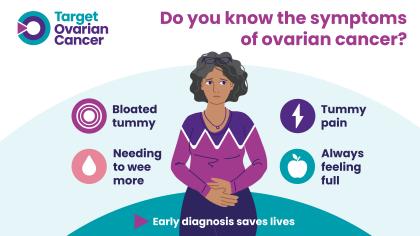Progress in ovarian cancer is possible, if urgent action is taken. That’s why the announcement of a new study to pilot use of an advanced blood test for ovarian cancer is encouraging for the ovarian cancer community.
About the SONATA study
TranSforming Ovarian caNcer diAgnostic paThwAys (SONATA) will take place across GP surgeries in the West Midlands for the next 18 months and will offer a blood test called ROMA to patients experiencing symptoms of ovarian cancer.
The symptoms are: persistent bloating, abdominal pain, feeling full quickly and needing to wee more often.

If diagnosed at the earliest stage, 9 in 10 women will survive ovarian cancer. But two thirds of women are diagnosed late, when the cancer is harder to treat. An early diagnosis means quicker access to treatment and primary care play a vital role in getting the right diagnosis.
This is why studies such as this are encouraging as it is hoped that the advanced ROMA test will identify key markers of ovarian cancer at an earlier stage, helping healthcare professionals get patients on the right pathway as soon as possible. This study will help assess its impact.
Helen Dickens, Director of Programmes at Target Ovarian Cancer, said
This is exciting news for the ovarian cancer community. Identifying ovarian cancer at the earliest possible stage leads to better access to treatment and survival. If successful, this study will help us understand more about how we can ensure everyone receives the earliest possible diagnosis. We look forward to seeing the results.
Putting research into practice
Sandwell and West Birmingham (SWB) NHS Trust and Walsall Healthcare NHS Trust (WHT) will be pairing up with primary care provider Modailty and the University of Birmingham to run this study.
The results from the study, funded by the NHS Cancer Programme and the Small Business Research Initiative, will be analysed and could be used to change the way this cancer is diagnosed in the future.
Chair of Target Ovarian Cancer’s Pathfinder Advisory Panel and consultant in gynaecological cancer surgery Sandwell and West Birmingham NHS Trust, Professor Sudha Sundar said:
It’s an exciting study which is a great example of integrated working between all the organisations involved. We are looking forward to finding out the results so that we can change the way this cancer is detected in the future and drastically improve survival rates.
What we’re doing to improve early diagnosis
Healthcare professionals are essential to improving early diagnosis, that’s why we continue to work closely with them every single day. We provide educational modules and training to increase knowledge of the disease, campaign for investment in resource, and work collaboratively with NHS cancer alliances to assist healthcare professionals in diagnosis.
Lately we've been working on a project – the first of its kind – with GPs and healthcare professionals to test new ways to help diagnose ovarian cancer faster.
We've developed three interventions which healthcare professionals working in general practice can use to help them spot the symptoms of ovarian cancer and get everyone the tests they need, as fast as possible.
Improvements to early diagnosis is a priority for everyone here at Target Ovarian Cancer, and we will not stop until we see improvements made.
Target Ovarian Cancer will be supporting the SONATA study - read more about it.



